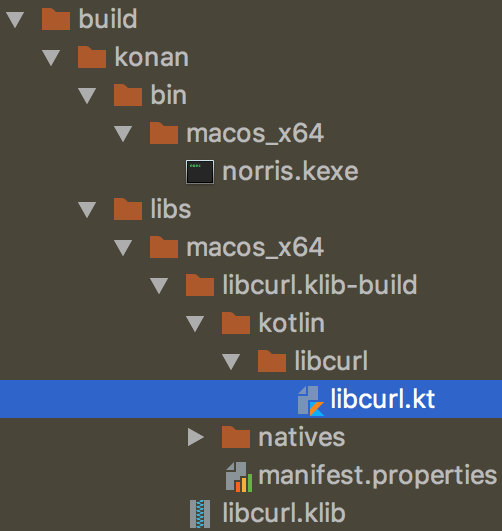All content on this website is licensed under a Creative Commons Attribution-NonCommercial-NoDerivatives 4.0 International License. Built with Jekyll using the Hyde theme. The Kotlin logo is the property of JetBrains. Made with ❤️ by Tadej

In this tutorial, we’re going to create a simple program using a C library libcurl. Before starting, you’ll need to know the very basics of:
Create a new directory for this project. Inside the directory, initialize Gradle by executing
$ gradle init
Open build.gradle and paste the following:
plugins {
id "org.jetbrains.kotlin.konan" version "1.3.11"
}
konanArtifacts {
program "http"
}
Next, we need to get our hands on a libcurl library. Your OS might already have curl installed. If so, you need to find the path to curl.h header file. On a Mac, it is usually located in /usr/include/curl/curl.h. If you don’t have it installed, or cannot find the curl.h file, don’t worry. Download and extract the latest version, then install the library following the documentation. The header file is in the include/curl directory.
Kotlin/Native comes with a handy tool called cinterop. It takes a C library and wraps Kotlin code around it, so you can interact with it seamlessly. To use it, we need a definition file which provides information about the library we want to create bindings for. Each library gets its own definition file, named the same as the library.
Create a new file called libcurl.def in your root project directory. Then, add a line denoting the header file:
headers = /absolute/path/to/your/curl/curl.h
There’s one more executable that will come handy: curl-config. If you didn’t have to install the library, it’s most likely already part of your path. Otherwise, you’ll find it in the library folder you extracted. Run the following:
$ curl-config --libs
The output is the linking information we need in the definition file. If you didn’t install the library, it might be as simple as -lcurl. If you did install it, it might look like -L/usr/local/lib -lcurl -lldap -lz. Copy it, and add it to the definition file as a linkerOpts value, so your libcurl.def looks like this:
headers = /absolute/path/to/your/curl/curl.h
linkerOpts = -L/usr/local/lib -lcurl -lldap -lz # "curl-config --libs" output
While cinterop tool can do a lot more, this is all we need to run our program. We now need to tell Gradle about our definition file and include the generated bindings in our program. Here’s the updated build.gradle:
plugins {
id "org.jetbrains.kotlin.konan" version "1.3.11"
}
konanArtifacts {
interop "libcurl", {
defFile "libcurl.def"
}
program "http", {
libraries {
artifact "libcurl"
}
}
}
The interop closure - when executed - will generate Kotlin bindings based on the provided defFile. To use the bindings in your program, simply add them as an artifact inside a libraries closure.
Before building, add a simple main stub to satisfy the compiler. Create a src/main/kotlin/Http.kt file with an empty main function:
fun main(args: Array<String>) {
// Empty for now.
}
Now run gradle build. Once successfully built, inspect the build folder content:

The libcurl.kt contains the library bindings. Time to put them to use! A simple HTTP GET request using libcurl can be found here, and looks like this:
#include <stdio.h>
#include <curl/curl.h>
int main(void)
{
CURL *curl;
CURLcode res;
curl = curl_easy_init();
if(curl) {
curl_easy_setopt(curl, CURLOPT_URL, "https://example.com");
curl_easy_setopt(curl, CURLOPT_FOLLOWLOCATION, 1L);
res = curl_easy_perform(curl);
if(res != CURLE_OK)
fprintf(stderr, "curl_easy_perform() failed: %s\n", curl_easy_strerror(res));
curl_easy_cleanup(curl);
}
return 0;
}
Here’s how the above looks in Kotlin/Native, using libcurl bindings:
import libcurl.*
import kotlinx.cinterop.*
fun main(args: Array<String>) {
val curl = curl_easy_init()
if (curl != null) {
curl_easy_setopt(curl, CURLOPT_URL, "https://example.com"")
curl_easy_setopt(curl, CURLOPT_FOLLOWLOCATION, 1L)
val res = curl_easy_perform(curl)
if (res != CURLE_OK) {
val err: CPointer<ByteVar>? = curl_easy_strerror(res)
val message: String = err?.toKString() ?: "unknown error"
println("curl_easy_perform() failed: ${message}")
}
curl_easy_cleanup(curl)
}
}
As you can see, there is very little difference between the languages. There are a few things to note in the Kotlin code:
libcurl bindings, all we need to do is import them,libcurl function names remain exactly the same (e.g. curl_easy_init)CURL or CURLcode can be deferred by the compiler.While unnecessary, we’ve also introduced two types inside the if statement. They are part of kotlinx.cinterop library. Pointers and arrays in Kotlin/Native are mapped to CPointer<T>?. The docs for curl_easy_strerror state the return type of the function is const char*. The interop docs tell us that’s represented as ByteVar in Kotlin/Native, therefore the err is of type CPointer<ByteVar>?.
To transform a C string represented as CPointer<ByteVar>? to a Kotlin string, we can use the CPointer<ByteVar>.toKString() extension method. Refer to the docs for more information.
Finally, note the curl_easy_cleanup(curl) function. As discussed in a brief introduction, when interacting with a C library, you need to manually clean up the allocated objects.